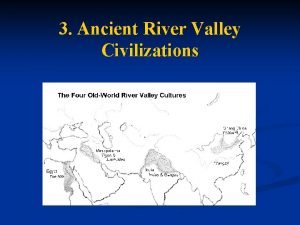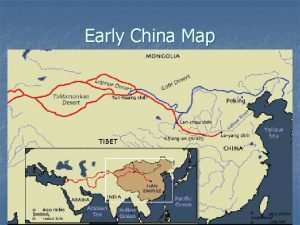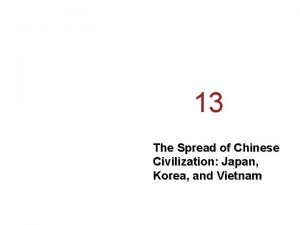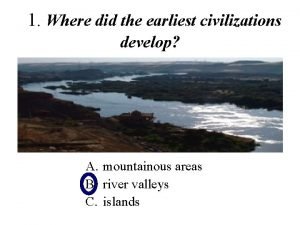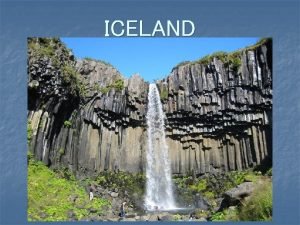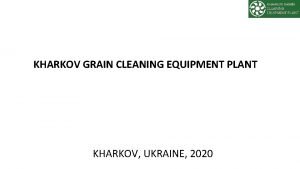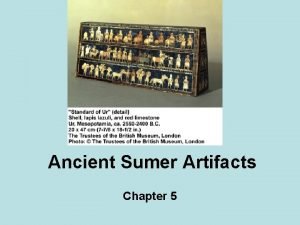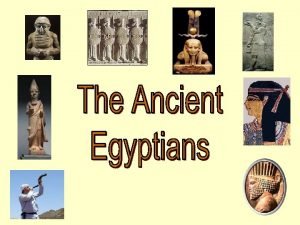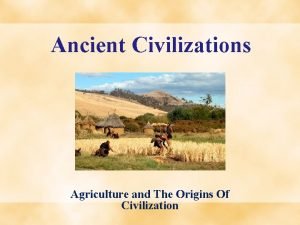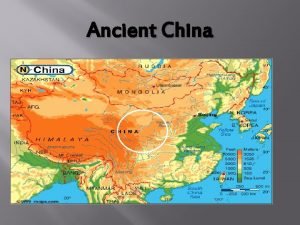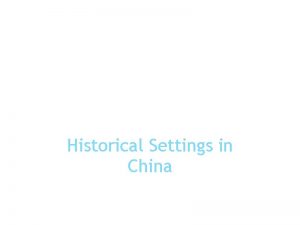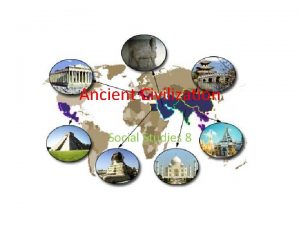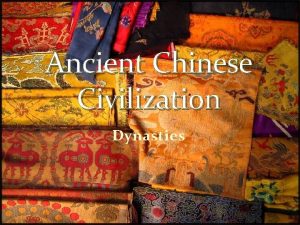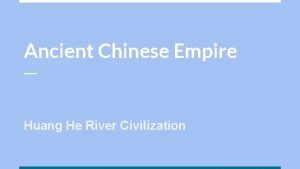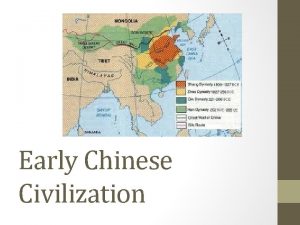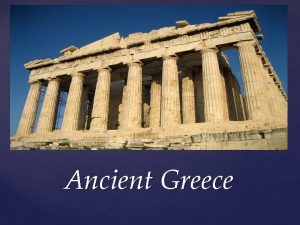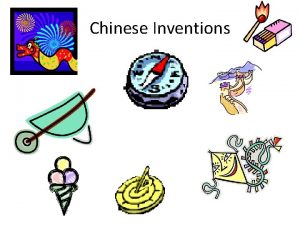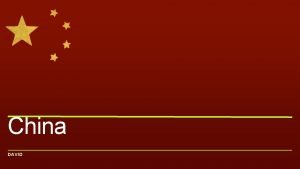THE DEVELOPMENT OF CHINESE CIVILIZATION Ancient China Recent














- Slides: 14

THE DEVELOPMENT OF CHINESE CIVILIZATION

Ancient China • Recent archaeological evidence suggests that civilization developed along the Yangtze River in China even before civilization emerged in the Fertile Crescent.

The Zhou Dynasty � � � There is a dynasty when a family rules over a kingdom, typically for generations. The Zhou Dynasty that ruled over part of what is now China ruled for nearly 800 years (1045 B. C. E. to 256 B. C. E. It was the longest lasting dynasty in Chinese History.

Mandate of Heaven � � � The Zhou Dynasty claimed it ruled, because it possessed the Mandate of Heaven. The Mandate of Heaven was approval to rule from natural and divine spirits that kept the universe in order. But if a king failed to rule effectively, it was interpreted he had lost the Mandate of Heaven. Therefore, it was okay to rebel.

Life During the Zhou Dynasty � � � Peasants (commoners) worked on lands owned by their lord. But peasants had their own land they had to farm too. Artisans (craftsmen) worked in walled towns under control of their local lord. Merchants were considered property of lords. There was also a class of slaves.

Ancient Chinese Families • Filial piety- was the duty of members to put the needs and desires of the male head of the family before their own. • Male supremacy was a key element in their society. • The male was responsible for providing food for his family.

Confucius • Confucius was born during the reign of the Zhou Dynasty in 551 BCE. • Upset by the violence and moral decay in his time, he traveled around China in attempts to persuade political leaders to follow his ideas. • He was first and foremost a philosopher – a wise person who studies some aspect of nature and provides advise. • Confucius developed a group of faithful followers, but it was not until a couple of dynasties after his death that his ideas became the philosophy of the land.

Confucianism’s Two Elements � � Duty – All people had to put the needs of family before their own. Humanity – Do unto others as you would have done to you. Have compassion and empathy.

Rule by Merit � � Confucius also believed that government positions should not just go to the sons of nobles but should go to all men of talent. Han emperors (later on) used this philosophy in establishing a civil service exam. � The higher the performance on the exam, the greater the position one would be assigned in the government.

Qin Dynasty � � Qin Shihuangdi overthrew the last Zhou ruler and founded the Qin Dynasty. He ruled from 221 BCE to 202 BCE.

The Qin Emperor To keep Mongolian nomad invaders out of his empire, he connected a system of walls around northern China. The final product is known as the Great Wall.

Terra Cotta Army When the Qin Emperor died he was buried with an army that would serve his purposes in the after life.

Legalism � � This was the philosophy or body of ideas that the Qin Emperor used to govern his empire. He believed people were naturally evil and would only do right if governed by harsh laws and stiff punishments.

Cruelty and Madness of the Qin Emperor � � If scholars wrote books that opposed his ideas, he had the books burned. He had scholars buried alive for disagreeing with him. People were sent to work on the Great Wall as punishment, and it was a death sentence. He wanted an immortality potion and finally drank mercury, which poisoned him.
 Ancient chinese civilization
Ancient chinese civilization Ancient india vs ancient china
Ancient india vs ancient china Early china map
Early china map Chinese civilization map
Chinese civilization map Anglo chinese school primary
Anglo chinese school primary Where did the earliest civilizations develop
Where did the earliest civilizations develop How did the ming dynasty restore chinese rule to china?
How did the ming dynasty restore chinese rule to china? 969
969 Iceland: thaw plate -news -china -chinese -alibaba -amazon
Iceland: thaw plate -news -china -chinese -alibaba -amazon Paraguay: packing -news -china -chinese -alibaba -amazon
Paraguay: packing -news -china -chinese -alibaba -amazon Ukraine: impeller -news -china -chinese -alibaba -amazon
Ukraine: impeller -news -china -chinese -alibaba -amazon Artifact
Artifact Ancient egypt civilization geography
Ancient egypt civilization geography Ancient egypt civilization
Ancient egypt civilization Ancient civilization agriculture
Ancient civilization agriculture
